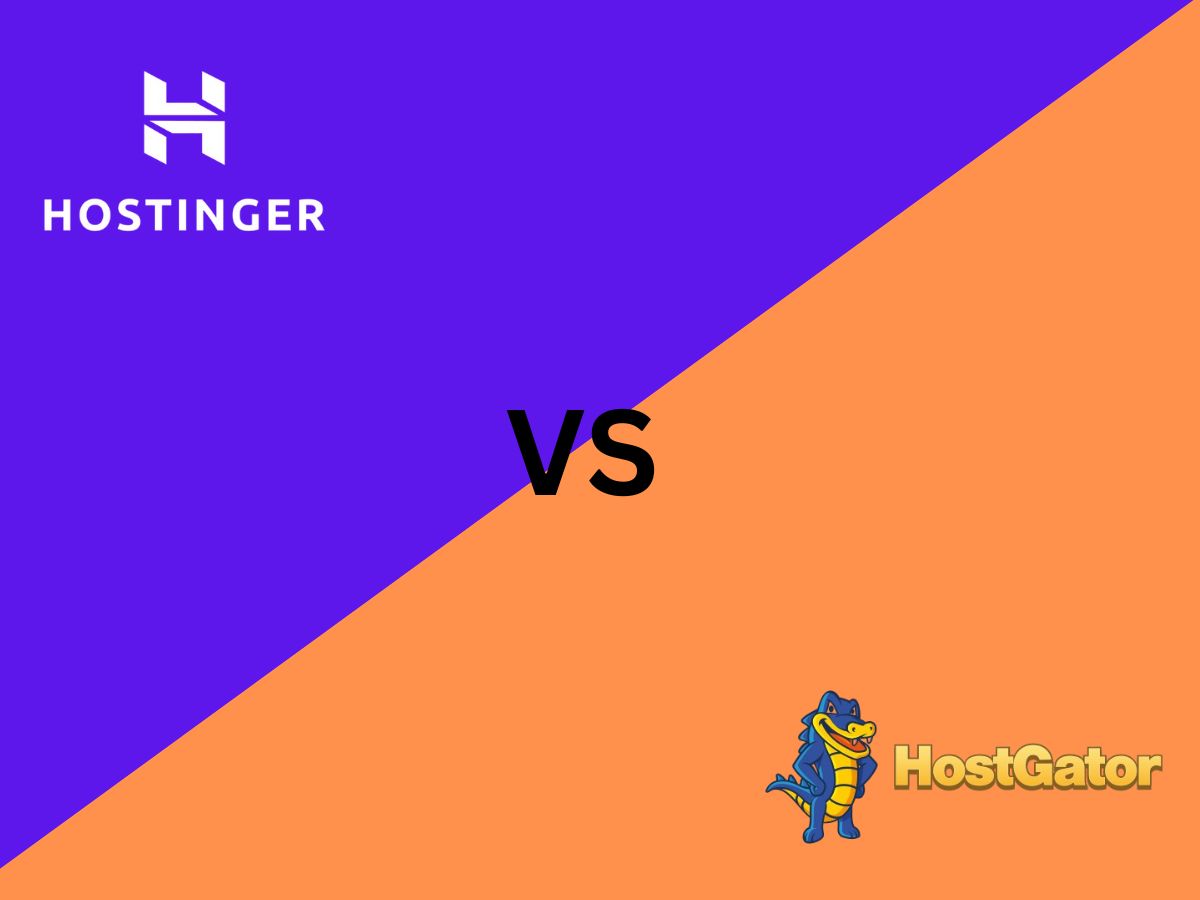Hostinger vs HostGator are among the top web hosting services, all while serving clients with dependable services and specific benefits. Hostinger appeals to many with its low-cost hosting, fast performance, and client-friendly design, which are fit for first-time users and small-scale companies. It also offers impressive results using LiteSpeed hosts and data centers from several points across the globe. HostGator, however, has a reputation for providing top customer service, plenty of bandwidth, and reliable website uptime. It’s a sensible option when you want a hosting platform that can expand easily. The decision is yours, based on whether you prefer affordable and fast service with Hostinger or diverse and helpful service with HostGator. Both of them are excellent options.
Quick Verdict: Hostinger vs Hostgator
Users looking for cheap, fast hosting that is easy to use and offers a modern look should choose Hostinger. Personal sites, blogs, and small companies that need to save money will like it well. Although HostGator is a bit more costly, it provides unlimited resources, a high uptime guarantee, and helpful customer service, which is why it’s useful for large sites or those looking for greater flexibility. If you need hosting right away and at the best price, pick Hostinger. If you are looking for a traditional kind of hosting with plenty of features and help, HostGator should fit your needs. In the end, either is reliable, but Hostinger is more affordable and less complicated.
Pros and Cons of Hostinger
Pros
You get fast page loads thanks to LiteSpeed servers and automatic caching.
Locations of servers around the globe, including the US, UK, India, Singapore and more.
You get good features at fair prices.
Backups are done for you every day/week (depending on your plan)
A modern and user-friendly hPanel makes it simple for people to learn (even new users).
WordPress websites that load fast with the help of LSCWP.
You get FREE SSL, a domain, and email when you sign up.
Cons
Help is available only through live chat and email.
A custom CDN has to be set up manually through Cloudflare.
There are fewer sophisticated tools available for developers than there are with cPanel.
Pros and Cons of HostGator
Pros
Any time, day or night, they can be reached by phone, chat, or email.
Advanced users will appreciate the familiar interface of cPanel.
All shared tariffs come with no limits on storage and bandwidth.
Free website builder tool including several website templates
SSL, domain, and email are supplied at no cost.
The CDN from Cloudflare is standard on the majority of plans.
Cons
Apache servers cause this service to be slower than some of our higher-tier plans.
Paid daily backups using CodeGuard as an add-on
There are only servers located within the United States
Renewal prices are notably greater than those presented during marketing
Plans and Options: Hostinger vs Hostgator
Hostinger and HostGator have many shared hosting options, but the way they price and what they offer varies slightly. At Hostinger, you can get shared hosting as cheap as $2.99 per month, and the prices drop even more when you sign up for longer. The Premium Shared Hosting package the company offers provides 100 websites, a large 100 GB SSD storage capacity, free email,l and a free domain for those who choose it on an annual plan.
Shared hosting on HostGator will usually cost $3.75 a month (promotional price) and includes a Hatchling Plan that gives you one website, great bandwidth, and a free domain for the first year. With the best plans, you can host as many websites as you like and use bonus tools such as a free dedicated IP and SEO for your websites. Though HostGator offers a lot of unlimited features, Hostinger is preferred because it is faster, modern-looking looking and more affordable to keep. In general, people usually pick Hostinger for its cheap and fast features, while HostGator is best for users who prefer traditional and feature-filled hosting.
Hostinger vs Hostgator: Features Comparison
Hostinger vs Hostgator: Website Speed
In terms of website speed, Hostinger achieves better results than HostGator, generally for sites on shared hosting.
Hostinger offers LiteSpeed Web Server, which speeds up your website and automatically caches your content (LSCache). Because of this, websites hosted with Hostinger experience quicker loading times, thanks to the benefits of CDN for many visitors, or with WordPress. Fast loading for users worldwide is made possible by the company’s network of data centers in the US, Europe, Asia, and elsewhere.
Instead of LiteSpeed, HostGator employs Apache servers, which are dependable but offer less speed while managing large numbers of connections or handing out cached material. Although HostGator reaches good uptime and performs well, its server response is slower,r and page speed lags behind Hostinger, especially during independent speed comparisons.
In short, when performance and page load time are the main concerns, for sites with lots of text or products, Hostinger is generally better than HostGator for these things.
Hostinger vs Hostgator: User Interface
It is easy to notice the difference in design, how smooth the access is, and the way users feel while using the interface in Hostinger and HostGator.
Hostinger offers hPanel, its own clean and intuitive control panel that is easy for starters. You can manage your domains, emails, files, and backups all together on a nicely presented dashboard. The interface is simple but strong, which means newbies can handle and administer their hosting without too much difficulty. In addition, users can use hPanel to set up WordPress, monitor site performance, and access support from the dashboard itself.
Unlike SiteGround, HostGator uses the classic cPanel, providing innovative features that web hosting specialists are used to. While cPanel lets you handle many options, it is often felt to be confusing or dated when someone is just starting. If you’re an advanced user, you may like the fine controls, but new users might take some time getting used to them.
In essence, Hostinger makes it easy with their smooth hPanel, great for new and everyday site owners, whereas HostGator gives experienced users and technically-inclined owners all the tools they need with cPanel.
Security
Hostinger and HostGator ensure security, but they deliver their safety tools differently.
Hostinger
Security forms a key aspect of the services Hostinger provides. Your residential plan will always include the following
You get free SSL certificates on every website you use.
DDoS protection
Cloudflare-protected nameservers
All plans include automatic backups performed every day or week.
Using BitNinja or Imunify360 firewall, you can guard yourself from malware and brute-force attacks.
Application of 2FA to user accounts
Consistent server monitoring and immediate alerts
The LiteSpeed Web Server that Hostinger uses comes with tough security and quick reaction to threats.
HostGator
HostGator supplies simple security, although advanced tools need to be bought separately.
Offered free of charge, SSL certificates
Firewall and DDoS protection that is custom-configured
You need to manually back up your website every week, but CodeGuard, our paid backup plan, gives you unlimited storage.
Although SiteLock Security scans and protects your site against malware, it must be purchased separately.
While the company uses 2FA and general account protection, it is not advertised as much as you’ll see at Hostinger.
The extra security features Hostinger has built in mean it is a better choice for users who want secure hosting at no extra cost. Security at HostGator is decent, but covering everything fully requires choosing paid security services. If you are looking for a single security solution that is price-free, Hostinger is your better choice.
Customer Support
Hostinger and HostGator are both available for customer support around the clock, even if their methods, replies, and support options are a bit different.
Hostinger
Primarily, companies assist customers with 24/7 live chat and email/ticketing. Phone assistance is not provided, and this may not suit everyone.
Generally, I get a reply in a reasonable time, and it’s almost instant on live chat. It doesn’t usually take long for questions to be answered.
Friendly, competent, and responsive support is what makes Hostinger a good choice for beginners.
Help Resources: Many articles, video tutorials, and walkthroughs are available on the dashboard.
You can’t contact Customer Support over the phone, and there might be delays if the site is very busy.
HostGator
Support is provided by live chat that is live around the clock, phone support, and a ticket system.
While live chat and phone are pretty quick, tickets may not be answered as fast.
Helpful: You can count on support, but users state that at times, resolving some issues may be slightly inconsistent or take more time when there are a lot of people.
You can find numerous articles, how-tos, and video tutorials on the biggest support portal for self-help.
You should use Hostinger if you like a fresh online chat support system that does not require calling.
Use HostGator in case you need phone help and are looking for common kinds of support.
Hostinger provides better user support, while HostGator offers several kinds of help, but can sometimes be inconsistent.
Server Location
Because Hostinger has many more server options globally than HostGator, your website can be faster and work well when accessed outside of your country.
Hostinger
Because Hostinger has data centers all over the world, you can bring your website closer to your audience. Currently, you can choose a server location from:
USA
United Kingdom
Netherlands
Lithuania
Singapore
India
Brazil
By spreading across so many servers, users can enjoy greater freedom and quicker page loading for everyone. Hostinger supports user selection of a server location at setup which improves both website speed and its ranking in local search engines.
HostGator
HostGator’s web infrastructure mainly uses servers in the United States, centrally located in:
Provo, Utah
Houston, Texas
Although HostGator’s Tier 3 data centers are reliable, shared hosting clients will not find data centers outside the United States at this time. Because of these issues, geographically distant users have a harder time connecting to the network.
If your website visitors come from outside the U.S., Hostinger has a clear benefit from its servers around the world.
When most of your visitors are from the U.S., HostGator can still meet expectations, though you won’t have as many options.
The winner of the server location options is Hostinger.
Backup
Hostinger gives you better backup services than HostGator when recovering files becomes a priority for you. All new users have weekly backups included, and Premium and Business users enjoy daily backups as well, with no added costs. From the convenient hPanel account, users can restore or get their backups directly. Some advanced plans make it possible to back up your data whenever you are about to make big changes.
Unlike SiteGround, HostGator gives you free weekly backups, but every week, they are overwritten. If you like the idea of keeping backups or restore points on a daily basis, you need to buy CodeGuard, a paid extra service. HostGator leaves the task of restoring data mostly to their support team, unless you have CodeGuard turned on.
In general, Hostinger stands out for providing strong and simple backups at great value, making it best suited to anyone concerned about securing their site data.
Final Verdict: Hostinger vs Hostgator
It works perfectly for people who care about quick performance, low cost, a simple user interface, and benefits like daily backups and servers around the world. Its power is most notable with WordPress sites and web pages from different countries. HostGator is better for people who want a simple cPanel setup, can handle calls, and require unlimited resources. Yet, it is slower than other hosts, and you’ll have to pay extra for things like daily backups. To sum up, Hostinger is best for users who aim for speed and great value, and HostGator has the edge for users looking for traditional tools and professional assistance.









